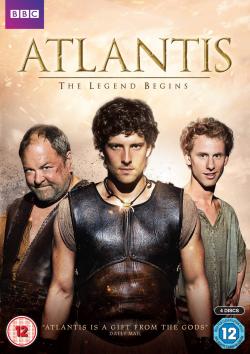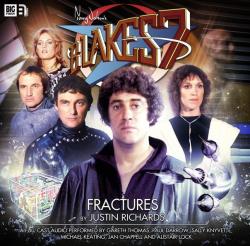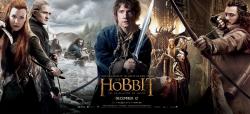Atlantis Part Two
Saturday, 12 April 2014 - Reviewed by

Atlantis
7 - Rules of Engagement
8 - The Furies
9 - Pandora's Box
10 - The Price of Hope
11 - Hunger Pangs
12/13 - Touched by the Gods
BBC One
Released: 10 February 2014
Dedicated viewers of this new fantasy/action-adventure show will receive some nice development and twists in relation to the main story of this opening season. However problems of inconsistency and homogenous settings and set pieces are never far away -even in those episodes which reach higher quality than any of the opening half dozen.
I might as well make clear that I don't think Jack Donnelly is being used well - and by that I mean that he would be a serviceable secondary character for some other prime time TV show, or by the same token certainly watchable in a cinema released British rom-com. There are elements where he shines when he looks just a bit comical and helpless and his pretty boy looks would work well with a strong leading lady to complement him. But even with the best scripts that this writing and production team put on the table, we have a lead hero in Jason that seems to work in reminding us how low-key fantasy shows can be. If done by the numbers one story in this genre can very much resemble another. If the characters all come out with dialogue that seems labored and pre-meditated then the suspension of disbelief most viewers are required to apply just wiill not be there, due to their grounding in realistic drama elsewhere.
This show continues to invest in some fine guest stars. Amongst experienced character actors such as Fintan McKeown, Anton Lesser and David Stern, there is good work from Gemma Jones and Jason Watkins, plus some showcases of more fledgling talent like Nora-Jane Noone and Will Merrick. Many casual viewers will be quick to recognise and enjoy the efforts of widely known favourites of stage and/or screen - Robert Linsday Julian Glover and John Hannah. Just in terms of investing in acting chops, the producers are doing a fine job and may be able to build a good solid audience that have different people coming back each week for different reasons.
But it is almost then trying to be bold enough to say - "here is the license payers money to show you who we can set up a contract with.. But just enjoy the antics of the main actors -- after all they are the ones who flash on the screen at the start and end of the show. What, you want some proper development of these new character? Even if they are one-offs? Sorry, try another channel altogether'. Now I seriously doubt this experienced team who have helmed Merlin and Misfits would really want to convey such a message. But in the process of executing their work duties, they nonetheless manage to look a gift shop horse in the mouth.
Thankfully however the better regulars seem to be going from strength to strength. Pythagoras is shown to have a very dark side in relation to troubled family relations, and Robert Emms belatedly does more than just turn in an OK or respectable portrayal.. I am left hoping that he plays a more proactive role in the upcoming second season - and perhaps he will develop his acting style organically in the process. Whilst I enjoyed Will Merrick in 'Skins', I found that when called upon to be gritty and troubled as Aracas - brother to Pythagoras - rather than hapless that the actor didn't quite have the range needed. I would be happy to be proved wrong in a potential reappearance next year though, as the seeds for a good character driven storyline were sown despite the overall episode (the Furies) being less than totally successful.
Also the amiable cuddly Hercules is shown to have less than noble qualities in his determined chase of Medusa. Something that a cynic might say almost deserves the tragic twist in these two characters dynamic come episodes 9 and 10. Much buildup and character development was given over to this strong female character, who continues to be portrayed with skill and charm by Jemima Rooper. The investment the regular audience has put into this secondary lead is rewarded handsomely/. And the buffoonish Hercules is now someone to be concerned for, rather than just to laugh at and root for in a light-hearted fashion.
Which makes the generic and frustratingly slow-to-learn Jason all the more startling and difficult to comprehend. His reaction to his friends' plight, along with his development as a fighter and a quick thinker should mean there is a growth in the audiences' journey with him as he becomes a tried-and-tested Atlantean resident. Yet the mirage of believing that this is a fully-fleshed person and not a character issued with some hard-and-fast traits essentially dwindles and instead the viewer can only grasp the proportions of a forced caricature.
But the show arguably save the best for last, and in a fashion suggesting that the opening season could be shrugged off as 'growing pains' in several years time as the BBC have another big hitter. The two-part finale makes up for the rather weak eighth and eleventh episodes, and build on the sold if unspectacular episodes that realign Medusa's role is in the general scheme of things. Episode 7 is certainly the best stand alone episode of the 1st season until the finale. If such an episode became the norm and perhaps some more multi parters were used, then the show could show enough versatility to make more use of its latent potential. I hope the creative team are somewhere in a meeting coming up with better storylines that fulfil the perennial 'beginning-middle-and end' recipe for success, without being overly conventional and safe.
'Touched by the Gods' deals with some 'dead wood' that might still be of interest for a number of future episodes - i.e. evil witch Circe and Heptarian but which drama and excitement justifies.. And the twist with Pasipahes' tie to Jason may not be totally shocking but promises some fun conflicts of interest, with deep emotions clashing with pre-conceived and ruthless plans for power
My thoughts on the production values, music and other similar aspects have not changed. This is in large part due to the convention of serial show like this heavily re-using resources from episode to episode. At the end of the day the scripts and performances matter to me, being a British viewer of a home-grown show, and other elements have been perhaps less pressing - certainly when it came to watching archive TV like Doctor Who, Blake's 7 and Randall and Hopkirk. If the core of a show is strong and dynamic usually other departments 'raise their game'. At the time of writing I can only hope that someone or a group of people have turned a corner and convinced the overall cast and crew that this show is not just salvageable but actually a great treasure trove of wonder, mystery and court intrigue. In short tea-time adventures that engage the under 12s, the over 65s, and the in-betweeners in equal measure .








